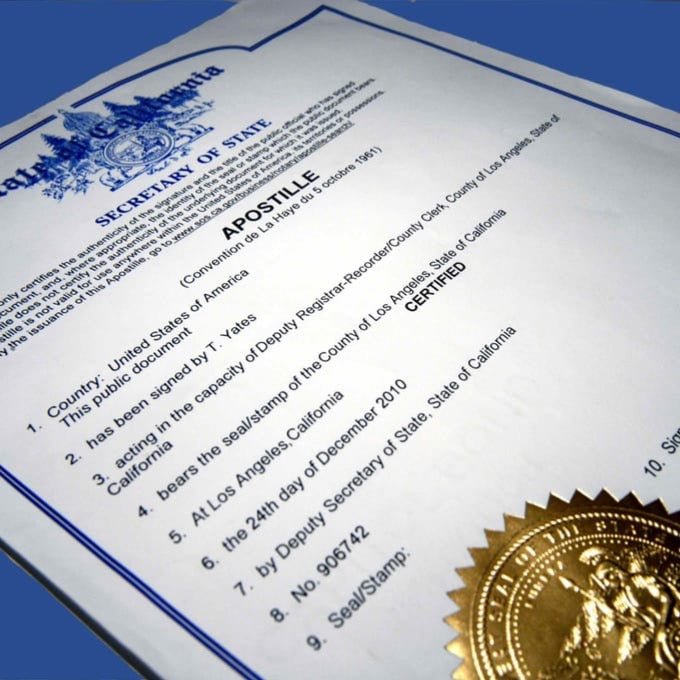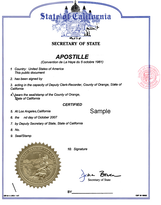Apostille Houston Solutions-- Legalize Your Files easily
Apostille Houston Solutions-- Legalize Your Files easily
Blog Article
Understanding the Apostille Refine: A Comprehensive Guide to International Record Verification
Browsing the intricate landscape of global record authentication can be discouraging without a clear understanding of the apostille procedure. This overview thoroughly lays out the needed actions, from identifying which papers call for qualification to submitting them for confirmation by the Competent Authority. Understanding the relevance of an apostille and acknowledging prospective challenges, such as incomplete entries and language obstacles, can significantly simplify the authentication journey. What exactly specifies an apostille, and why is it so crucial for files destined for Hague Convention countries? These inquiries form the structure of our exploration right into this crucial lawful treatment.
What Is an Apostille?
An apostille is a main accreditation that verifies the authenticity of a file for use in another country. This certification, released by a designated authority in the nation where the document stemmed, guarantees that the file is acknowledged as legitimate and legitimate in the international arena. The process of acquiring an apostille involves several steps, consisting of the confirmation of the paper's signatures, seals, and stamps by proper governmental bodies.
The apostille functions as an internationally acknowledged form of verification, made feasible by the Hague Convention of 1961. This treaty, formally called the Hague Convention Eliminating the Requirement of Legalisation for Foreign Public Records, systematizes the process of record certification among participant nations. The apostille itself is a standard certification that contains certain information, such as the releasing authority, the native land, and the day of issuance.
It is very important to keep in mind that not all records are eligible for an apostille. Usually, public papers like birth certifications, marital relationship licenses, court orders, and instructional diplomas get approved for this qualification. Personal papers, such as contracts and arrangements, might call for registration and extra steps to certify.
Value of Apostille
Recognizing what an apostille is sets the stage for valuing its significance in international dealings. houston tx apostille. An apostille, essentially a kind of certification released by a designated authority, verifies the credibility of a file for usage in international countries that are signatories to the Hague Apostille Convention. This standard process gets rid of the need for further legalisation by consular offices or consulates, thus simplifying global deals
The value of an apostille can not be overstated. It guarantees the integrity and approval of important documents-- such as birth certifications, marital relationship licenses, and educational diplomas-- throughout boundaries. For businesses, it facilitates the smooth conduct of global profession, mergings, and acquisitions by providing a trusted approach of paper verification. This minimizes bureaucratic difficulties, saving both time and resources.
In addition, an apostille enhances lawful protection and compliance. Governments and establishments can with confidence depend on the authenticity of papers birthing an apostille, mitigating the danger of scams and misrepresentation. Thus, the apostille acts as an important tool in advertising global teamwork and trust. Its duty in cultivating reliable and secure worldwide purchases go to this website underscores its indispensable value in today's interconnected world.
Documents That Call For Apostille
When participating in global deals or legal issues, particular papers typically require the verification given by an apostille. This ensures their recognition and approval in nations that are notaries to the Hague Apostille Convention. Frequently, individual papers such as birth certifications, marital relationship certifications, and death certificates call for an apostille, specifically when they are utilized for procedures like immigration, marriage abroad, or global probate issues.
Educational papers are an additional category often requiring apostilles. Diplomas, transcripts, and academic records typically need this authentication for purposes such as seeking more education and learning, work, or professional licensing in an international country (houston tx apostille). This action guarantees that the records are recognized as legitimate and valid
Legal documents, consisting of powers of lawyer, affidavits, and court orders, likewise typically demand apostilles. Service papers such as certificates of incorporation, bylaws, and commercial contracts might require an apostille to assist in global profession, develop international branches, or take part in cross-border lawful procedures.
Actions to Acquire an Apostille

Acquiring an apostille entails a multi-step procedure that makes sure the authenticity and acceptance of your papers in international countries. The initial step is recognizing which papers need an apostille. houston tx apostille. Common files include birth certifications, marriage licenses, academic records, and company papers
Once determined, the paper has to be licensed by the appropriate issuing authority. This might include notarization by a notary public or verification by a neighborhood or state authorities, depending upon the kind of paper. After qualification, the document should be sent to the marked Competent Authority in the record's native land. In the United States, as an example, this is typically the Assistant of State's office for each state.
The entry procedure typically calls for a completed application, the original file, and a cost. Some territories may supply the alternative of expedited processing for an added cost. Upon successful verification, the Competent Authority will affix the apostille certificate to the paper, visit this site thereby confirming its authenticity.
Common Obstacles and Solutions
Browsing the apostille procedure can offer a number of common obstacles that, if not effectively resolved, may postpone or make complex record authentication. Each nation has details requirements for the types of files that can be apostilled, and any type of variance from these can result in being rejected.
Another common challenge is understanding the varied processing times. Processing times can differ significantly between countries and also in read this between various areas within the exact same country. It is important to represent these variations when planning the apostille process to stay clear of unanticipated hold-ups.
Furthermore, language barriers can position significant obstacles. Documents in an international language usually call for licensed translations, and any type of inaccuracies in translation can lead to more issues. Engaging a professional translation solution can alleviate this danger.

Conclusion
Grasping the apostille process substantially enhances the effectiveness of international paper authentication. By comprehending the requirement of identifying and accrediting needed documents, and navigating the entry to the Competent Authority, the process comes to be more workable.
Report this page